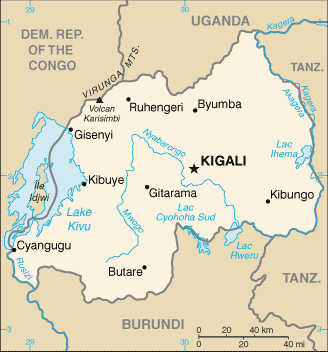Welcome to the Virtual Education Wiki ~ Open Education Wiki
Rwanda
Partners situated in Rwanda
None.
Rwanda in a nutshell
(sourced from http://en.wikipedia.org/wiki/Rwanda)
Rwanda, in full the Republic of Rwanda, known as the Land of a Thousand Hills, is a country located in the Great Lakes region of eastern-central Africa, bordered by Uganda to the north, Burundi to the south, the Congo Democratic Republic to the west and Tanzania to the east. Although close to the equator the country has a cool temperate climate due to its high elevation. (Kigali has an average temperature of 19 degrees Celsius.) The country is slightly smaller than the US state of Massachusetts, or about half the size of Scotland in the UK.
Its population is a little over 10 million.
Its capital is Kigali.
Rwanda is also renowned for its beautiful terrain with mostly grassy uplands and scenic, gently rolling hills. Its abundant wildlife, including the rare mountain gorillas are popular with eco-lovers and tourism has become one of the biggest sectors of the country's economy.
It is not the general policy of Re.ViCa to dwell on the troubled past of countries, but it is impossible to discuss the situation in Rwanda without referring to the 1994 genocide, in which an estimated 800,000 people were killed. (For an entry to this material see http://en.wikipedia.org/wiki/Rwandan_Genocide.)

Since then the country has made a remarkable recovery and is now considered as a model for developing countries. In 2009 a report labeled Rwanda as "Africa's biggest success story", having achieved stability, economic growth (average income has tripled in the past ten years) and international integration. The government is widely seen as one of the more efficient and honest ones in Africa.
Rwanda is, as of November 2009, a member of the Commonwealth of Nations, making the country one of only two in the Commonwealth without a British colonial past.
Rwanda is divided into five provinces (intara) and subdivided into thirty districts (akarere). Four provinces have the unexciting names of North, South, East and West; and the fifth province is Kigali Province.
Most Rwandans speak Kinyarwanda, one of the country's three official languages, and in market towns many people speak Swahili. Educated Rwandans speak French and English. In 2008 the Rwandan government announced that English would become the primary language of instruction in schools, replacing French. This change was initiated "to ensure further integration with the global economic community".
Most Rwandans are Christian, with significant changes since the genocide. A 2006 study reported that some 56% of the population were Catholic and 37% Protestant. Some estimates suggest that the Muslim population of the country is as high as 14% but others suggest levels as low as 5%.
Rwanda education policy
Net primary enrollment rate was at 74 % in 2004. Public expenditure was at 3.8 % of the GDP in 2002-2005.
A significant minority of the adult population of Rwanda is illiterate, particularly women.
Public primary education has become fee-free. Kinyarwanda, French and English are taught generally.
Rwanda education system
As of 2003/4 there were 2262 primary and 504 secondary schools in the country. A small subset of these are listed at http://en.wikipedia.org/wiki/List_of_schools_in_Rwanda
Higher education
There are 20 places of higher education in Rwanda with 6 public and 14 private[67]:
Public
Kigali Institute of Science and Technology (est. 1998 by UNDP) [68] National University of Rwanda (1963) Umutara Polytechnic (2004) Kigali Institute of Education Kigali Health Institute Higher Agriculture and Veterinary Institute School of Finance and Banking Private
Adventist University of Central Africa Kigali Independent University Kigali Lay Adventist University Gitwe Institute of Education Kibungo University of Agriculture, Technology and Education Kabgayi Catholic University Butare Protestant Theological College International College of Accountancy and Management Nyakibanda Major Seminary Byumba Polytechnic Institute Rwanda Pentecostal University Kigali Professional Institute
Universities in Rwanda
Polytechnics in Rwanda
Higher education reform
The Bologna Process
Administration and finance
Quality assurance
Rwanda HEIs in the information society
Towards the information society
Information society strategy
Rwanda leads the region in terms of ICT adoption and infrastructure development. The country has a 100% mobile telecommunication coverage. Three Mobile phone operators (MTN, RwandaTel and TIGO) provide 3G mobile phone and internet services.
In 2009, WiBro technology was launched in Kigali enabling users to access high speed wireless Internet from any part of the city.
The postal system is mostly reliable. Those wishing to receive post must register and pay for annually, a Post Office Box at the Post Office.
There is one national television station: Rwanda Television which broadcasts feeds from various international broadcasters during the day. The evening programming largely consists of locally produced news programming repeated in Kinyarwanda, English and French.
Subscription-based satellite television is easily available. There are currently two operators: South African based DSTV and China based Star Communications.